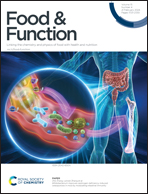The role of free fatty acid receptor-1 in gastric contractions in Suncus murinus†
Abstract
Motilin is an important hormonal regulator in the migrating motor complex (MMC). Free fatty acid receptor-1 (FFAR1, also known as GPR40) has been reported to stimulate motilin release in human duodenal organoids. However, how FFAR1 regulates gastric motility in vivo is unclear. This study investigated the role of FFAR1 in the regulation of gastric contractions and its possible mechanism of action using Suncus murinus. Firstly, intragastric administration of oleic acid (C18:1, OA), a natural ligand for FFAR1, stimulated phase II-like contractions, followed by phase III-like contractions in the fasted state, and the gastric emptying rate was accelerated. The administration of GW1100, an FFAR1 antagonist, inhibited the effects of OA-induced gastric contractions. Intravenous infusion of a ghrelin receptor antagonist (DLS) or serotonin 4 (5-HT4) receptor antagonist (GR125487) inhibited phase II-like contractions and prolonged the onset of phase III-like contractions induced by OA. MA-2029, a motilin receptor antagonist, delayed the occurrence of phase III-like contractions. In vagotomized suncus, OA did not induce phase II-like contractions. In addition, OA promoted gastric emptying through a vagal pathway during the postprandial period. However, OA did not directly act on the gastric body to induce contractions in vitro. In summary, this study indicates that ghrelin, motilin, 5-HT, and the vagus nerve are involved in the role of FFAR1 regulating MMC. Our findings provide novel evidence for the involvement of nutritional factors in the regulation of gastric motility.



 Please wait while we load your content...
Please wait while we load your content...